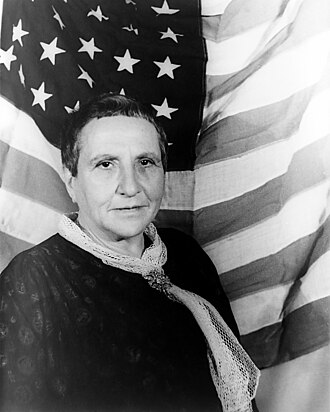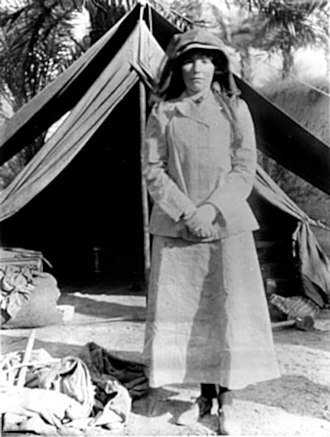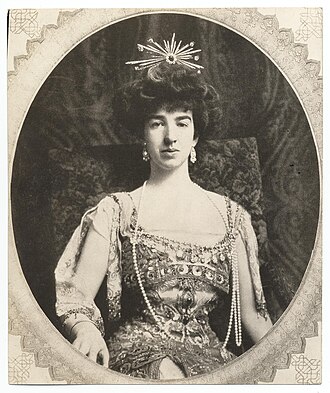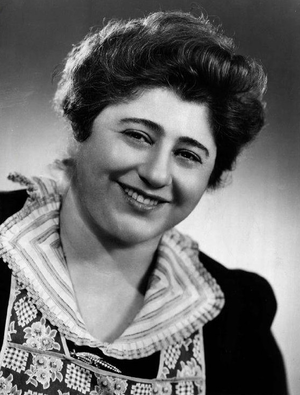Discover Your Roots
SIGN UPDiscover Your Roots
SIGN UPGertrude is a female name of Dutch origin, meaning "Spear of Strength." Derived from Germanic roots, "Gertrude" signifies both "spear" and "strength." The diminutive form "Trudy" has evolved into a standalone name. In German-speaking regions, "Gertraud" is a familiar variation, while "Gartred" and "Gertruda" are rare variations. The name's historical significance is reflected in the notable individuals who have borne it, from suffragists and writers to athletes and activists. The name has also been immortalized in literature and entertainment, with "Gertrude" appearing in William Shakespeare's "Hamlet" and as a character in the anime/manga series "Strike Witches." This strong and enduring name evokes power and resilience, making it a timeless choice for a female child.

Gertrude Stein (February 3, 1874 – July 27, 1946) was an influential American writer, poet, playwright, and art collector known for her significant contributions to modernist literature and art. Born in Allegheny, Pennsylvania, she later moved to Paris in 1903, where she became a central figure in the modernist literary and artistic circles, hosting a renowned salon attended by luminaries such as Pablo Picasso, Ernest Hemingway, and F. Scott Fitzgerald. Stein's literary works, including "The Autobiography of Alice B. Toklas" and "Tender Buttons," gained widespread recognition and propelled her to mainstream fame. Notably, her innovative writing style has been associated with the "stream of consciousness" technique. Throughout her life, she authored several novels, plays, and poetry collections, exploring themes of love, identity, and society. Stein's impact on literature and art continues to be studied and celebrated, although her activities during World War II, including her connections with Nazi collaborators, have been the subject of scrutiny and debate. Despite controversies surrounding her wartime associations, Gertrude Stein's literary legacy remains a significant and enduring influence on modernist literature and art.

Gertrude Margaret Lowthian Bell (14 July 1868 – 12 July 1926) was an influential English writer, traveller, political officer, administrator, and archaeologist. Her extensive travels and deep understanding of the Middle East made her a crucial figure in British imperial policy-making as an Arabist. Highly esteemed and trusted by British officials, she participated in key conferences that shaped the post-War Middle East. Bell advocated for independent Arab states and supported the installation of Hashemite monarchies in Jordan and Iraq. Raised in privilege, she obtained an education at Oxford University and made influential connections. An accomplished mountain climber and equestrian, she expressed great affection for the Middle East and participated in archaeological digs. Bell played a significant role in the nation-building of Iraq and was appointed the Honorary Director of Antiquities, where she worked to prevent unauthorized looting of artifacts and supported education for Iraqi women. She also founded the Iraq Museum to display the country's archaeological treasures. Bell's extensive writings and translations, as well as her influence on government thinking during World War I, contributed to her lasting legacy. Despite her tragic death in 1926, her impact on Middle Eastern politics and archaeology endures.

Gertrude Vanderbilt Whitney (January 9, 1875 – April 18, 1942) was an influential American sculptor, art patron, and collector, best known as the founder of the Whitney Museum of American Art in New York City. Born into the affluent Vanderbilt family, she displayed an early interest in the arts, which led her to pursue sculpture after being inspired by the art world of Europe during her travels in the early 1900s. Despite facing initial resistance and working under an assumed name, she persisted and went on to create monumental works that garnered recognition. During World War I, Whitney devoted herself to relief efforts and established a hospital for wounded soldiers in France, where she also made drawings that influenced her later memorials in New York City. Throughout her career, she held several solo exhibitions, showcasing her work to critical acclaim. Her artistic legacy continues to be celebrated, with the Whitney Museum of American Art honoring her contributions through commemorative shows of her work. Gertrude Vanderbilt Whitney's lasting impact on American art and her dedication to philanthropy solidify her as a significant figure in the art world.

Gertrude Lawrence (4 July 1898 – 6 September 1952) was an English actress, singer, dancer, and musical comedy performer famous for her stage appearances in the West End of London and on Broadway in New York. Born in Newington, London to a basso profondo father and a mother who worked in the chorus of the Christmas pantomime, Lawrence's talent was evident from a young age. She received free lessons from Italia Conti and began her stage career in various productions. Lawrence's early career was marked by challenges, including a failed marriage and health issues, but she persevered and eventually found success in the legitimate theater. Her breakthrough came in 1921 when she replaced an ailing Beatrice Lillie in the production A to Z, where she introduced the song "Limehouse Blues," which became one of her signature tunes. Lawrence's close friendship with Noël Coward was a significant part of her professional life. Throughout her career, she continued to captivate audiences with her performances, leaving a lasting legacy in the world of entertainment.

Gertrude Berg, born Tillie Edelstein, was an American actress, screenwriter, and producer who made significant contributions to classic radio and television. She was a trailblazer, being one of the first women to create, write, produce, and star in a long-running hit with her serial comedy-drama The Rise of the Goldbergs, later known as The Goldbergs. Berg's career was marked by numerous accolades, including a Tony Award and an Emmy Award for Best Lead Actress.Born in 1899 in East Harlem, New York City, Berg's early life was marked by personal tragedy and challenges. Despite these difficulties, she found her creative calling and honed her theatrical skills while producing skits at her father's Catskills Mountains resort. Berg's career breakthrough came when she developed a semi-autobiographical skit into a radio show, which eventually led to the creation of The Rise of the Goldbergs. Her dedication to her craft was evident as she wrote the show's scripts by hand and continued to do so throughout its run on the air.Notably, Berg successfully transitioned The Goldbergs from radio to television, where she continued to portray the iconic character of Molly Goldberg. The show's depiction of immigrant life and the struggles of the Goldberg family resonated with audiences, making it a beloved and relatable portrayal of American Jewish immigrant experiences. Berg's commitment to her work and her resilience were evident as she faced challenges during the McCarthy Era
All images displayed on this page are sourced from Wikipedia or Wikimedia Commons.We use these images under their respective Creative Commons or public domain licenses. Wherever applicable, author attributions and license information are provided. If you believe an image is used incorrectly or outside its license terms, please contact us so that we can review and correct the issue.